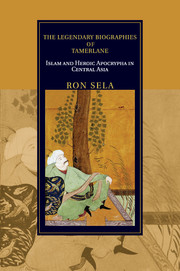Book contents
- Frontmatter
- Contents
- Acknowledgments
- List of abbreviations
- Note on translation and transliteration
- Map
- Introduction
- 1 The Origins and Usages of Tīmūr's Heroic Apocrypha
- 2 Tīmūr's Birth and Childhood
- 3 Youth
- 4 Inauguration and Kingship
- 5 Premonitions
- 6 Central Asia in Turmoil, 1700–1750
- Conclusion
- Bibliography
- Index
- Cambridge Studies in Islamic Civilization
6 - Central Asia in Turmoil, 1700–1750
Published online by Cambridge University Press: 05 July 2011
- Frontmatter
- Contents
- Acknowledgments
- List of abbreviations
- Note on translation and transliteration
- Map
- Introduction
- 1 The Origins and Usages of Tīmūr's Heroic Apocrypha
- 2 Tīmūr's Birth and Childhood
- 3 Youth
- 4 Inauguration and Kingship
- 5 Premonitions
- 6 Central Asia in Turmoil, 1700–1750
- Conclusion
- Bibliography
- Index
- Cambridge Studies in Islamic Civilization
Summary
In reflecting upon the poverty of Tūrān and Arabia, I was at first at a loss to assign a reason, why those countries had never been able to retain wealth, whilst, on the contrary, it is daily increasing in Hindustan. Tīmūr carried into Tūrān the riches of Turkey, Persia, and Hindustan, but they are all dissipated.… It is evident that this dissipation of the riches of a state must have happened either from some extraordinary drains, or from some defect in the government. Hindustan has been frequently plundered by foreign invaders, and not one of its Kings ever gained for it any acquisition of wealth; neither has the country many mines of gold and silver, and yet Hindustan abounds in money, and every other kind of wealth. The abundance of species is undoubtedly owing to the large importation of gold and silver in the ships of Europe, and other nations, many of whom bring ready money in exchange for the manufactures and natural productions of the country. If this is not the cause of the prosperous state of Hindustan, it must be owing to the peculiar blessingof God.
[‘Abd al-Karīm Kashmīrī, 1740]The study of Central Asia's history in the first half of the eighteenth century, scanty as it has been, has been dominated by the paradigm of a region in decline: a political and economic crisis that afflicted the land as the different Central Asian polities struggled and could not measure up to former, more glorious days in the region's history.
- Type
- Chapter
- Information
- The Legendary Biographies of TamerlaneIslam and Heroic Apocrypha in Central Asia, pp. 117 - 140Publisher: Cambridge University PressPrint publication year: 2011



